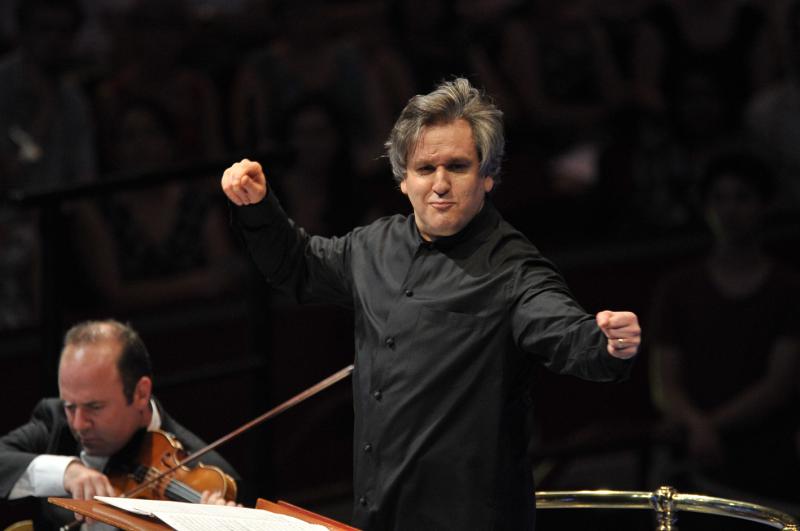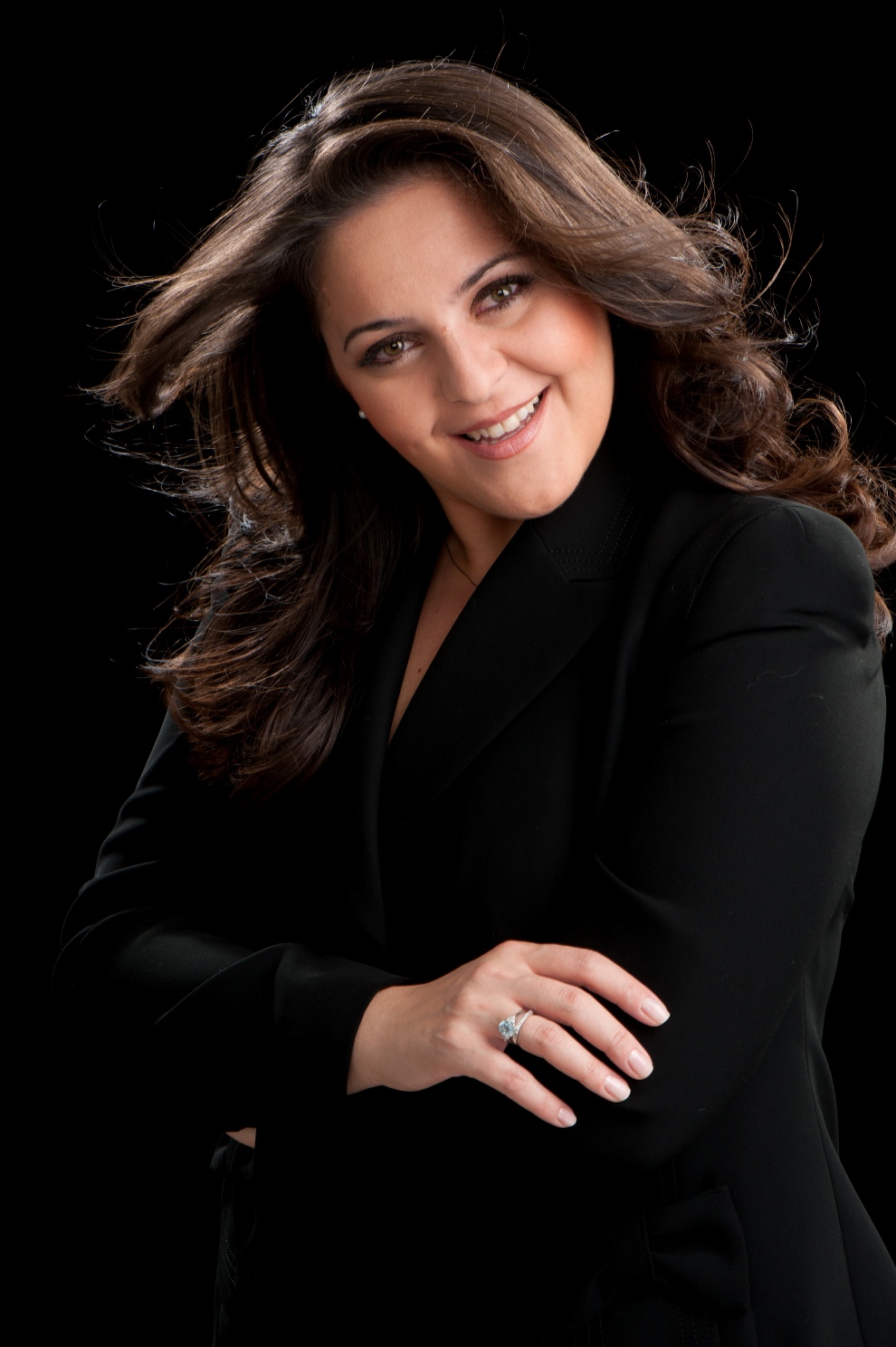Prom 12: Accademia di Santa Cecilia Chorus and Orchestra, Pappano | reviews, news & interviews
Prom 12: Accademia di Santa Cecilia Chorus and Orchestra, Pappano
Prom 12: Accademia di Santa Cecilia Chorus and Orchestra, Pappano
Italian choral singing shines, but the Verdi rarities on offer don't approach the Requiem

It’s a dilemma of anniversary years, and never more so than with Wagner’s and Verdi’s 200th birthdays: do you stick to the masterpieces or try and bring the rarities to life? No-one would have minded, I suspect, if Antonio Pappano and the Accademia di Santa Cecilia forces he has raised to the level of one of the world’s great ensembles had reprised their peerless Verdi Requiem.
Oh for the Ave Maria of Otello’s Desdemona, you couldn’t help thinking as ethereal Italian soprano Maria Agresta projected her lovely sounds so well into the Albert Hall in a relatively routine 1880 "Hail Mary". Wasn’t Verdi amazing, you realized, in the adjustments he made to his 1869 Libera Me, part of a composite memorial to Rossini, when he re-used it in the Requiem? Often just an altered note or an octave change would make all the difference. Perhaps because of the context, Pappano and Agresta (pictured below by Rolando Paolo Guezoni) kept it rather light, though the professional voices of the Santa Cecilia Chorus spat out their lines in the racy fugue with real Italianate intensity.
 The Four Sacred Pieces showcased the Roman voices' louds and softs to perfection in an acoustic which for once proved welcoming (choral Proms usually come off best). Another, this time unaccompanied Ave Maria, and the Laudi alla Vergine to Dante's beautiful text may have revealed a stray operatic voice in the pianissimos, but no chorus in the world could have given more focused attack to the big outbursts of the Stabat Mater and Te Deum.
The Four Sacred Pieces showcased the Roman voices' louds and softs to perfection in an acoustic which for once proved welcoming (choral Proms usually come off best). Another, this time unaccompanied Ave Maria, and the Laudi alla Vergine to Dante's beautiful text may have revealed a stray operatic voice in the pianissimos, but no chorus in the world could have given more focused attack to the big outbursts of the Stabat Mater and Te Deum.
The trouble with these longer and richly if selectively orchestrated pieces is that Verdi seems so keen to illustrate every turn of the religious texts that any longer line through the often very pictorial narrative never stands a chance. The melodies, such as they are, come across as second-drawer compared to the unfaltering inspiration of the Requiem, and much more bound by 19th century expectations of religious choral music.
Second-drawer, too, are most of the ideas in the curious String Quartet of 1873, arranged here for string orchestra by Carl Herrmann. The exception, a slow-waltz theme in an over-extended second movement which quickly lost the restless audience’s attention, could stand alongside the final death-dance in Un ballo in maschera. In the second subject of the opening Allegro, we hear Desdemona again; in the whirling Prestissimo, the ballet music of Macbeth’s witches. And for all the vivid dynamic and rhythmic contrasts Pappano urged from his now-superb Santa Cecilia strings, lightweight the piece remained: best enshrined in this form, as I first heard it, serving choreography in Kenneth MacMillan’s The Four Seasons for the Royal Ballet. Four star performances all round, then, but despite the enterprise only two for the programme.
rating
Share this article
The future of Arts Journalism
You can stop theartsdesk.com closing!
We urgently need financing to survive. Our fundraising drive has thus far raised £49,000 but we need to reach £100,000 or we will be forced to close. Please contribute here: https://gofund.me/c3f6033d
And if you can forward this information to anyone who might assist, we’d be grateful.

Subscribe to theartsdesk.com
Thank you for continuing to read our work on theartsdesk.com. For unlimited access to every article in its entirety, including our archive of more than 15,000 pieces, we're asking for £5 per month or £40 per year. We feel it's a very good deal, and hope you do too.
To take a subscription now simply click here.
And if you're looking for that extra gift for a friend or family member, why not treat them to a theartsdesk.com gift subscription?
more Classical music
 Bizet in 150th anniversary year: rich and rare French offerings from Palazzetto Bru Zane
Specialists in French romantic music unveil a treasure trove both live and on disc
Bizet in 150th anniversary year: rich and rare French offerings from Palazzetto Bru Zane
Specialists in French romantic music unveil a treasure trove both live and on disc
 Scottish Chamber Orchestra, Ibragimova, Queen’s Hall, Edinburgh review - rarities, novelties and drumrolls
A pity the SCO didn't pick a better showcase for a shining guest artist
Scottish Chamber Orchestra, Ibragimova, Queen’s Hall, Edinburgh review - rarities, novelties and drumrolls
A pity the SCO didn't pick a better showcase for a shining guest artist
 Kilsby, Parkes, Sinfonia of London, Wilson, Barbican review - string things zing and sing in expert hands
British masterpieces for strings plus other-worldly tenor and horn - and a muscular rarity
Kilsby, Parkes, Sinfonia of London, Wilson, Barbican review - string things zing and sing in expert hands
British masterpieces for strings plus other-worldly tenor and horn - and a muscular rarity
 From Historical to Hip-Hop, Classically Black Music Festival, Kings Place review - a cluster of impressive stars for the future
From quasi-Mozartian elegance to the gritty humour of a kitchen inspection
From Historical to Hip-Hop, Classically Black Music Festival, Kings Place review - a cluster of impressive stars for the future
From quasi-Mozartian elegance to the gritty humour of a kitchen inspection
 Shibe, LSO, Adès, Barbican review - gaudy and glorious new music alongside serene Sibelius
Adès’s passion makes persuasive case for the music he loves, both new and old
Shibe, LSO, Adès, Barbican review - gaudy and glorious new music alongside serene Sibelius
Adès’s passion makes persuasive case for the music he loves, both new and old
 Anja Mittermüller, Richard Fu, Wigmore Hall review - a glorious hall debut
The Austrian mezzo shines - at the age of 22
Anja Mittermüller, Richard Fu, Wigmore Hall review - a glorious hall debut
The Austrian mezzo shines - at the age of 22
 First Person: clarinettist Oliver Pashley on the new horizons of The Hermes Experiment's latest album
Compositions by members of this unusual quartet feature for the first time
First Person: clarinettist Oliver Pashley on the new horizons of The Hermes Experiment's latest album
Compositions by members of this unusual quartet feature for the first time
 Gesualdo Passione, Les Arts Florissants, Amala Dior Company, Barbican review - inspired collaboration excavates the music's humanity
At times it was like watching an anarchic religious procession
Gesualdo Passione, Les Arts Florissants, Amala Dior Company, Barbican review - inspired collaboration excavates the music's humanity
At times it was like watching an anarchic religious procession
 Classical CDs: Camels, concrete and cabaret
An influential American composer's 90th birthday box, plus British piano concertos and a father-and-son duo
Classical CDs: Camels, concrete and cabaret
An influential American composer's 90th birthday box, plus British piano concertos and a father-and-son duo
 Cockerham, Manchester Camerata, Sheen, Martin Harris Centre, Manchester review - re-enacting the dawn of modernism
Two UK premieres added to three miniatures from a seminal event of January 1914
Cockerham, Manchester Camerata, Sheen, Martin Harris Centre, Manchester review - re-enacting the dawn of modernism
Two UK premieres added to three miniatures from a seminal event of January 1914
 Kempf, Brno Philharmonic, Davies, Bridgewater Hall, Manchester review - European tradition meets American jazz
Bouncing Czechs enjoy their Gershwin and Brubeck alongside Janáček and Dvořák
Kempf, Brno Philharmonic, Davies, Bridgewater Hall, Manchester review - European tradition meets American jazz
Bouncing Czechs enjoy their Gershwin and Brubeck alongside Janáček and Dvořák
 Solomon, OAE, Butt, QEH review - daft Biblical whitewashing with great choruses
Even a top soprano and mezzo can’t make this Handel paean wholly convincing
Solomon, OAE, Butt, QEH review - daft Biblical whitewashing with great choruses
Even a top soprano and mezzo can’t make this Handel paean wholly convincing

Add comment